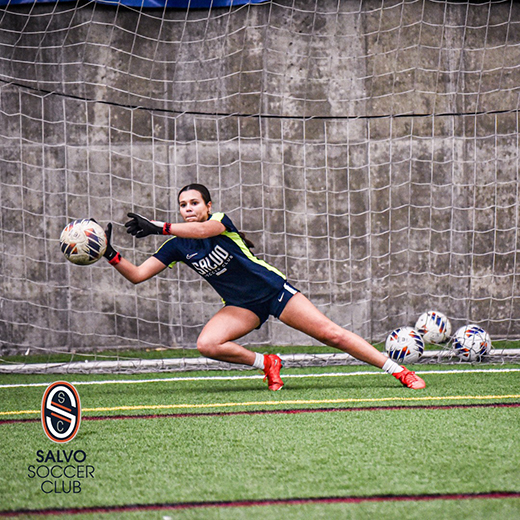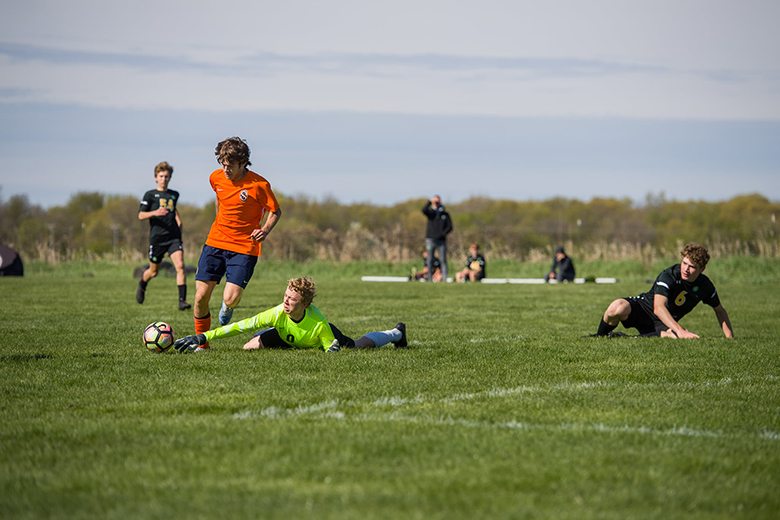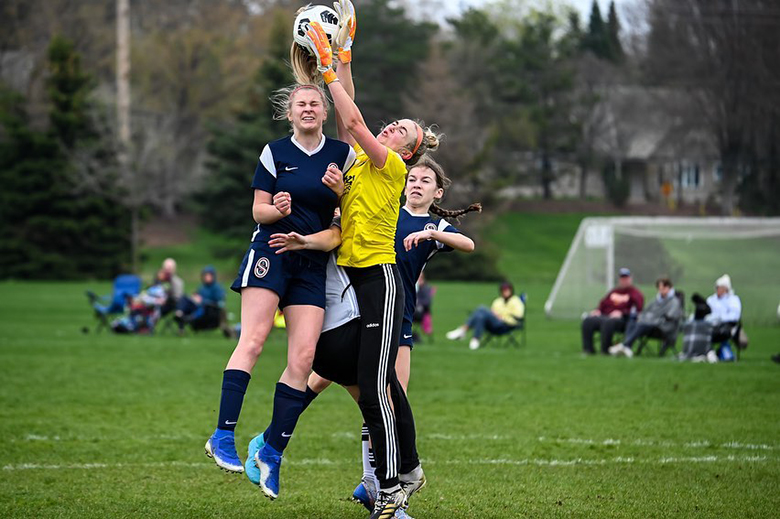Goalkeeper Training: Essential Techniques & Exercises for Young Keepers
If you've got a young soccer enthusiast at home who's excited about guarding the net, you're in the right place! Proper goalkeeper training is crucial for youth players aiming to excel in this demanding role.
This blog post from Salvo SC’s soccer instructors will guide you through essential techniques and exercises tailored for young goalkeepers. It will also offer valuable insights for soccer parents on how to support their budding goalkeepers effectively.
The Importance of Proper Goalkeeper Training for Youth Players
Training young goalkeepers isn't just about teaching them how to stop the ball; it's about nurturing their overall development in the sport. Proper training helps build a solid foundation, ensuring they grow with the right skills and mindset. It also reduces the risk of injuries and boosts their confidence on the field.
Goalkeeping requires a unique blend of physical and mental abilities. Unlike outfield players, goalkeepers need to master specific techniques that demand agility, quick reflexes, and strategic thinking. Training sessions focused on these areas can make a significant difference in their performance.
Understanding the importance of goalkeeper training is the first step towards helping your young athlete succeed. It sets the stage for more structured and effective practice sessions, making every minute on the field count.
Essential Techniques for Young Goalkeepers
Positioning
Proper positioning is essential for any goalkeeper. It helps them cover the maximum area of the goal and reduces the chances of conceding goals. Coaches should teach young keepers to stay on their toes and maintain a ready stance, always anticipating the next move.
Positioning isn't static; it requires constant adjustment based on the ball's location and the opposing players' actions. Goalkeepers should learn to read the game and position themselves accordingly. This skill comes with practice and experience but can be accelerated with targeted training.
For parents, understanding the importance of positioning can help you appreciate the complexity of goalkeeping. Encourage your child to focus on this aspect during training sessions and provide positive feedback when you see improvement.

Handling
Handling is the ability to catch, hold, and control the ball. It's a fundamental skill for goalkeepers, as good handling can prevent rebounds and second-chance opportunities for the opposing team. Young keepers should practice catching the ball cleanly and securely.
Training drills focusing on handling can include catching high balls, low balls, and everything in between. The key is repetition and consistency. Practicing with different types of balls and in various weather conditions can also help young goalkeepers adapt to any situation.
Parents can support this by providing opportunities for their children to practice handling outside of regular training sessions. Simple backyard games involving catching and throwing can make a big difference.
Diving
Diving is a critical skill for making those spectacular saves that every young goalkeeper dreams of. It involves proper techniques to ensure safety and effectiveness. Coaches should teach young keepers how to land safely and recover quickly.
Diving drills often start with basic movements and gradually increase in complexity. Young goalkeepers should practice both low and high dives, as well as side dives. Proper body positioning and landing techniques are crucial to avoid injuries.
Parents can help by encouraging their children to practice dives on soft surfaces like grass or padded mats. Reinforce the importance of safety and proper technique to build confidence and reduce the risk of injury.
Distribution
Distribution involves getting the ball back into play efficiently, whether by throwing, kicking, or rolling it to a teammate. Good distribution can turn defense into attack and is a vital skill for modern goalkeepers.
Young goalkeepers should practice different distribution techniques to become versatile. This includes short throws, long throws, goal kicks, and punts. Each method has its own set of circumstances where it's most effective.
Parents can support this aspect of training by encouraging their children to practice distribution at home. Simple drills like throwing the ball to a target or practicing goal kicks can make a big difference in their development.
Goalkeeper-Specific Exercises
Agility Drills
Agility is crucial for goalkeepers, allowing them to move quickly and efficiently within the goal area. Exercises like ladder drills, cone drills, and shuttle runs can significantly improve a goalkeeper's agility.
These drills focus on quick footwork and rapid direction changes. They help young goalkeepers develop the speed and coordination needed to make quick saves and recoveries. Consistent practice of agility drills can lead to noticeable improvements on the field.
Parents can set up simple agility drills at home using cones or other markers. Encouraging regular practice can help reinforce what is learned during formal training sessions.
Reflex Training
Reflexes are essential for making those split-second saves that can change the outcome of a game. Reflex training exercises, such as reaction ball drills and quick reaction tests, can help sharpen a goalkeeper's reflexes.
These exercises focus on improving hand-eye coordination and reaction times. Goalkeepers can practice catching and deflecting balls thrown at different speeds and angles. The goal is to respond quickly and accurately to unexpected situations.
Parents can assist with reflex training by playing simple reaction games with their children. Using a reaction ball or a tennis ball can make for fun and effective practice sessions.

Strength Building
Strength is vital for goalkeepers, as it enhances their ability to make powerful saves and withstand physical challenges. Strength-building exercises, such as squats, lunges, and core workouts, can improve a goalkeeper's overall physical condition.
These exercises focus on building muscle strength and endurance. Goalkeepers should incorporate both upper and lower body workouts into their training routines. A strong core is particularly important for maintaining balance and stability during dives and jumps.
Parents can encourage strength training by providing equipment like resistance bands or free weights for home use. Ensuring a balanced diet and proper nutrition can also support strength-building efforts.
The Role of Mental Training & Decision-Making for Goalkeepers
Mental Toughness
Mental toughness is a crucial attribute for goalkeepers, who often face high-pressure situations. Developing mental resilience can help young keepers stay focused and perform well under stress.
Techniques such as visualization, positive self-talk, and mindfulness can enhance mental toughness. Goalkeepers should practice staying calm and composed, even when the game is intense. Building mental strength takes time and consistent effort.
Parents can support their child's mental training by encouraging a positive mindset and providing emotional support. Teaching coping strategies for handling pressure can also be beneficial.
Decision-Making Skills
Goalkeepers need to make quick and accurate decisions, whether it's coming off the line to intercept a cross or deciding when to distribute the ball. Training should include exercises that simulate game scenarios to improve decision-making skills.
These exercises can involve small-sided games, scenario-based drills, and video analysis of matches. The goal is to help young goalkeepers develop the ability to assess situations quickly and choose the best course of action.
Parents can support decision-making training by discussing game scenarios and encouraging their children to think critically about their choices. Watching professional matches together and analyzing the goalkeepers' decisions can also be a learning opportunity.
Confidence Building
Confidence is key for goalkeepers, as self-assuredness can enhance performance. Building confidence involves positive reinforcement, setting achievable goals, and celebrating successes, no matter how small.
Coaches should create a supportive environment where young goalkeepers feel valued and encouraged. Providing constructive feedback and highlighting strengths can boost confidence. Confidence-building exercises can include role-playing scenarios and practicing high-pressure situations.
Parents can reinforce confidence by praising effort and improvement rather than just outcomes. Encouraging a growth mindset and helping their child set realistic goals can also contribute to building self-confidence.

Tips for Parents on Supporting Their Child's Goalkeeper Development
Encourage Regular Practice
Consistency is crucial for developing goalkeeping skills. Encourage your child to practice regularly, both during formal training sessions and at home. Setting aside dedicated practice time can help reinforce techniques and build muscle memory.
Parents can create a structured practice schedule that fits around school and other activities. Providing opportunities for informal practice, such as playing catch in the backyard, can also be beneficial.
Provide Positive Reinforcement
Positive reinforcement can go a long way in motivating young goalkeepers. Praise their efforts, highlight their progress, and celebrate their successes. Positive feedback can boost confidence and encourage continued improvement.
Parents should focus on effort and improvement rather than just outcomes. Providing specific praise for particular skills or actions can help young goalkeepers understand what they're doing well and where they can improve.
Stay Involved & Supportive
Being involved in your child's goalkeeping development can show them that you care and support their efforts. Attend their games, engage with their training, and be a source of encouragement and guidance.
Parents can stay involved by attending training sessions and matches, offering constructive feedback, and discussing their child's goals and aspirations. Showing genuine interest in their progress can help build a strong parent-child bond and foster a positive attitude towards goalkeeping.
Be a Goalkeeper at Salvo Soccer Club!
Proper goalkeeper training is essential for young players who aspire to excel in this challenging role. By focusing on essential techniques, specific exercises, and mental training, young goalkeepers can develop the skills and confidence needed to succeed.
Parents play a crucial role in supporting their child's development by encouraging regular practice, providing positive reinforcement, and staying involved in their training journey.
We hope this guide has provided valuable insights and practical tips to help you and your young goalkeeper on this exciting path. No matter where you are on your goalkeeper journey, you have a place with Salvo SC! From recreational community teams to more competitive travel and high-performance leagues, our club is designed for mobility and to help you achieve your soccer goals.
Connect with us if you have any questions, and sign up your goalkeeper for our Player ID session to help us place them in a team where they can fit in, grow, and perform at their highest level!